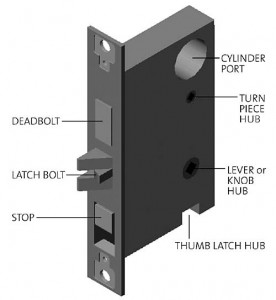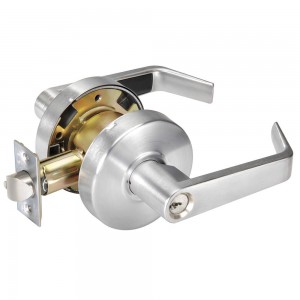If you were to install new locks on your facility, would you need a mortise lock or a cylindrical lock?
you were to install new locks on your facility, would you need a mortise lock or a cylindrical lock?
There are some big and important differences between the two, yet time and again we see the incorrect type of lock specified and installed, costing facilities money in either excessive repairs or unnecessary spend on hardware.
Let’s start with the basics and review the difference between a mortise lock and a cylindrical lock.
Mortise Lock vs. Cylindrical Lock – What’s The Difference?
Mortise Lock
If you look at the side of a door and there is a long plate around the latch bolt, the lock is likely a mortise lock, which are installed into a pocket (the mortise) cut into the side of the door.
Cylindrical Lock
If the plate around the latchbolt is short, you likely have a cylindrical lock on your hands. The body of a cylindrical lock is installed through the face of the door.
When Do You Need a Mortise Lock?
Mortise locks bring a host of benefits to the table and are available in a host of different lock functions – many more than cylindrical locks offer.
They are also incredibly durable because the bolts are bigger. The deadbolt is incorporated into the lock body, which makes it more secure, and it allows for the added benefit of releasing both the latch and the deadbolt when you turn the lever.
Because of heavier duty interior construction and heartier inner components, mortise locks can withstand a higher cycle count, or number of operations.
Mortise locks also come in a wide variety of design options, from sleek stainless steel to antique, rustic to contemporary. You also get a larger selection of trims and roses than you do with cylindrical locks.
So, what’s the downside? Price. They can be very expensive; often times three to four times the cost of a cylindrical lock.
When Do You Need a Cylindrical Lock?
While all of the benefits of a mortise lock may sound appealing, the high cost often hinders people from putting these locks on every door. Often, the added benefits of a mortise lock simply are not worth the high price.
Cylindrical locks are not only cheaper to purchase, their much simpler construction allows for a quicker installation, making them cheaper to install as well. Most doors come factory-prepped for cylindrical locks. If you are retrofitting an existing door, chances are you will have to bore the door to prep it for a mortise lock; whereas, you could simply install a new cylindrical lock.
There are still a wide variety of lock functions for cylindrical locks, and grade one levers are made to withstand high cycle counts. You can even get cylindrical locks with heavy-duty bolts.
So, if you have a door that isn’t going to receive as much abuse, or if cost is a concern and you don’t need fancy lock features, a cylindrical lock is likely your best choice.
If you have any questions or need help determining which lock type is best for you, let us know.

Katie (or other),
Can you recommend a Mortise repairer or seller? Five years ago, when I located to my current house, it’s front door had a non-functional mortise lock. Last year I finally obtained and installed a new one. Now that one failed. Paid a locksmith $120 to check it and wrestle with the heavy door to remove it. Even tho it’s officially under warranty, the supplier (baton, in California) won’t honor it saying two parts inside are bent and must have received extraordinary force, suggesting the someone tried to force entry into house. I’m fairly certain that is not so. I don’t want to risk a repeat of problems and expense. Can you recommend a high quality vendor?